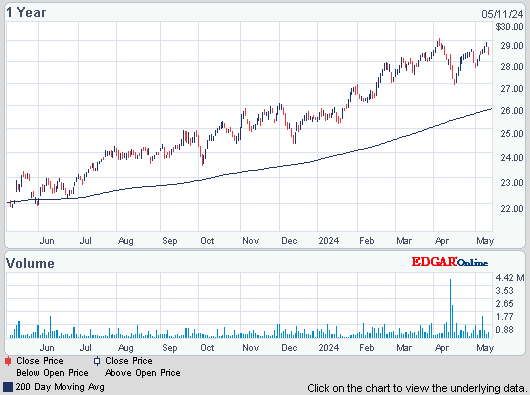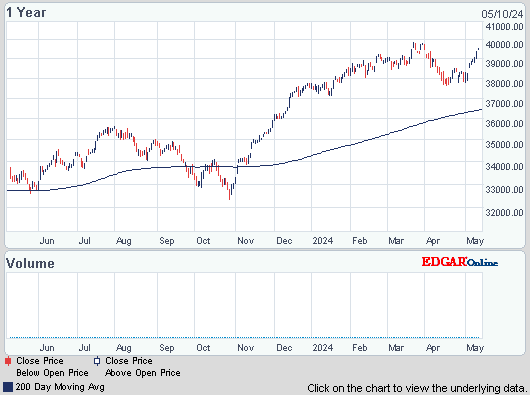Dow lost 93, decliners over advancers 3-1 & NAZ fell 27. The MLP index rebounded 5 to the 452s & the REIT index slipped 1 to 276. Junk bond funds were mixed & Treasuries drifted lower. Oil fell
for a 3rd day amid speculation that the Federal Reserve (FED) will
reduce stimulus & a forecast saying it will be difficult for oil to rally much more. Gold went back below 1300.
AMJ (Alerian MLP Index tracking fund)

![Live 24 hours gold chart [Kitco Inc.]](http://www.kitco.com/images/live/gold.gif)


Photo: Bloomberg
Federal Reserve Bank of Chicago President Charles Evans, who has been among the most vocal proponents of record monetary accommodation, said there has been “good improvement” in the labor market & indicated that a a tapering of the central bank’s bond-buying program in Sep is possible. Evans said the FED probably will have bought at least $1.2T of bonds from Jan 2013 until the time he sees the current quantitative easing program ending in mid-2014. “We’ve seen good improvement in the labor market, there’s no question in my mind about that.” “I’m still wanting to see greater evidence that it’s a sustainable improvement” & “I would clearly not rule” out a decision to begin dialing back the purchases in Sep. The central bankers are scrutinizing economic reports to determine if the labor market has substantially improved since last Sep, when they renewed an expansion of their balance sheet that’s now over $3.5T. The economy added the fewest jobs in 4 months in Jul, even as the unemployment rate fell to 7.4%. That employment report “wasn’t bad” yet was “not great,” Evans said. “We’re looking for continued labor improvement, payroll employment growth on the order of 175,000 to 200,000 per month.” Evans backed the timetable that was laid out by BigBen when Bernanke said the FOMC could start trimming its $85B in bond purchases later this year & may end it in the middle of 2014 if the economy improves along officials’ expectations. The decision to taper could come at the Sept. 17-18 meetings. Stay tuned.
Fed’s Evans Sees Labor Improvement With September Taper Possible
Rising tax receipts are shrinking the federal deficit, & that will shape the budget debate when Congress returns next month. The big question for lawmakers: Should they renew, end or modify the tens of billions of dollars in "sequester" cuts in gov spending that took effect earlier this year? Tax revenue thru Jun was up 14% from a year earlier, & that trend is expected to continue. New figures for Jul are due out next week, & for Aug on Sep 12 (3 days after lawmakers return to face threats of a gov shutdown on Oct 1 or an economy-threatening default on the national debt weeks later). With rising tax revenue, Reps are more opposed than ever to tax increases sought by the Dems. "This year the federal government will bring more revenue in than in any year in our history," says House Speaker John Boehner. "We have a spending problem in Washington. It has to be addressed." But Dems want to do away with some of the existing spending cuts, & they say they won't accept significant further reductions, unless there's also action to bring in still more revenue. "Democrats know we must do more to reduce the deficit," says Senate Majority Leader Harry Reid. "We believe in a balanced approach that pairs spending cuts with having those that can afford it pay more." At the same time, rising revenue could reduce the pressure to address the nation's long-term debt problems. Several factors are contributing to the increase in revenue. Congress increased income tax rates on high-income families in Jan. The CBO says some of those taxpayers probably cashed in investments ahead of the tax hike, boosting capital gains taxes. Congress also let a temporary payroll tax cut expire at the end of 2012, increasing Social Security taxes. CBO also said a rise in personal income is adding to tax revenue, even though economic growth has been sluggish.
Rising tax revenue eases pressure for budget cuts Associated Press

Photo: Bloomberg
German factory orders increased by the most in 8 months & UK industrial production beat forecasts in Jun, adding to evidence of a nascent recovery in Europe. Italy’s economic contraction slowed. German orders, adjusted for seasonal swings & inflation, increased 3.8% from a month earlier, driven by contracts for bulk items, the Economy Ministry in Berlin said. The forecast was for a gain of 1% in Jun. UK output climbed 1.1% from May. ECB President Mario Draghi said last week that a “tentative” stabilization in the euro area, which excludes the UK, is under way after at least 6 qtrs of contraction. That may benefit Germany, the region’s biggest economy, as its export-focused manufacturers boost European sales to counter a slowdown in Asia. German factory orders advanced 4.3% from a year ago, when adjusted for the number of working days, today’s report showed. Orders for investment goods climbed 6.8% from May, led by a 20% gain in orders from within the euro zone. The increase was the largest since Jun 2007 & partly reflects contracts signed at the Paris Show last month
Stocks are resting after an extended rise in recent weeks. There was little new today, but a lack of good news kept the bulls on the sidelines. Selling this week comes with a greater awareness about fiscal issues in DC along with concerns that next month the FED may finally begin slowing its bond purchases. The bullish outlook is trying to keep a delicate balance, continue economic growth but not too fast which will cause the FED to reduce its bond buying program. High stock prices have become addicted to low interest rates. Many interest rates have already risen in the last 3 months.
Dow Jones Industrials

AMJ (Alerian MLP Index tracking fund)
Tresury yields:
U.S. 3-month |
0.04% | |
U.S. 2-year |
0.31% | |
U.S. 10-year |
2.64% |
| CLU13.NYM | ...Crude Oil Sep 13 | ...105.37 | (1.1%) |
![Live 24 hours gold chart [Kitco Inc.]](http://www.kitco.com/images/live/gold.gif)


Photo: Bloomberg
Federal Reserve Bank of Chicago President Charles Evans, who has been among the most vocal proponents of record monetary accommodation, said there has been “good improvement” in the labor market & indicated that a a tapering of the central bank’s bond-buying program in Sep is possible. Evans said the FED probably will have bought at least $1.2T of bonds from Jan 2013 until the time he sees the current quantitative easing program ending in mid-2014. “We’ve seen good improvement in the labor market, there’s no question in my mind about that.” “I’m still wanting to see greater evidence that it’s a sustainable improvement” & “I would clearly not rule” out a decision to begin dialing back the purchases in Sep. The central bankers are scrutinizing economic reports to determine if the labor market has substantially improved since last Sep, when they renewed an expansion of their balance sheet that’s now over $3.5T. The economy added the fewest jobs in 4 months in Jul, even as the unemployment rate fell to 7.4%. That employment report “wasn’t bad” yet was “not great,” Evans said. “We’re looking for continued labor improvement, payroll employment growth on the order of 175,000 to 200,000 per month.” Evans backed the timetable that was laid out by BigBen when Bernanke said the FOMC could start trimming its $85B in bond purchases later this year & may end it in the middle of 2014 if the economy improves along officials’ expectations. The decision to taper could come at the Sept. 17-18 meetings. Stay tuned.
Fed’s Evans Sees Labor Improvement With September Taper Possible
Rising tax receipts are shrinking the federal deficit, & that will shape the budget debate when Congress returns next month. The big question for lawmakers: Should they renew, end or modify the tens of billions of dollars in "sequester" cuts in gov spending that took effect earlier this year? Tax revenue thru Jun was up 14% from a year earlier, & that trend is expected to continue. New figures for Jul are due out next week, & for Aug on Sep 12 (3 days after lawmakers return to face threats of a gov shutdown on Oct 1 or an economy-threatening default on the national debt weeks later). With rising tax revenue, Reps are more opposed than ever to tax increases sought by the Dems. "This year the federal government will bring more revenue in than in any year in our history," says House Speaker John Boehner. "We have a spending problem in Washington. It has to be addressed." But Dems want to do away with some of the existing spending cuts, & they say they won't accept significant further reductions, unless there's also action to bring in still more revenue. "Democrats know we must do more to reduce the deficit," says Senate Majority Leader Harry Reid. "We believe in a balanced approach that pairs spending cuts with having those that can afford it pay more." At the same time, rising revenue could reduce the pressure to address the nation's long-term debt problems. Several factors are contributing to the increase in revenue. Congress increased income tax rates on high-income families in Jan. The CBO says some of those taxpayers probably cashed in investments ahead of the tax hike, boosting capital gains taxes. Congress also let a temporary payroll tax cut expire at the end of 2012, increasing Social Security taxes. CBO also said a rise in personal income is adding to tax revenue, even though economic growth has been sluggish.
Rising tax revenue eases pressure for budget cuts Associated Press

Photo: Bloomberg
German factory orders increased by the most in 8 months & UK industrial production beat forecasts in Jun, adding to evidence of a nascent recovery in Europe. Italy’s economic contraction slowed. German orders, adjusted for seasonal swings & inflation, increased 3.8% from a month earlier, driven by contracts for bulk items, the Economy Ministry in Berlin said. The forecast was for a gain of 1% in Jun. UK output climbed 1.1% from May. ECB President Mario Draghi said last week that a “tentative” stabilization in the euro area, which excludes the UK, is under way after at least 6 qtrs of contraction. That may benefit Germany, the region’s biggest economy, as its export-focused manufacturers boost European sales to counter a slowdown in Asia. German factory orders advanced 4.3% from a year ago, when adjusted for the number of working days, today’s report showed. Orders for investment goods climbed 6.8% from May, led by a 20% gain in orders from within the euro zone. The increase was the largest since Jun 2007 & partly reflects contracts signed at the Paris Show last month
Stocks are resting after an extended rise in recent weeks. There was little new today, but a lack of good news kept the bulls on the sidelines. Selling this week comes with a greater awareness about fiscal issues in DC along with concerns that next month the FED may finally begin slowing its bond purchases. The bullish outlook is trying to keep a delicate balance, continue economic growth but not too fast which will cause the FED to reduce its bond buying program. High stock prices have become addicted to low interest rates. Many interest rates have already risen in the last 3 months.
Dow Jones Industrials
I just got word from one of my friends at MarketClub, that for a very limited time, they’re opening up their premium service for a no-cost, 2 week trial! Like many of you, I’m a huge fan of INO, and from what I have seen so far, their service Marketclub! This isn’t a stripped down version, everything in MarketClub is available to you. I don’t want to give everything away, but you’ll have unlimited access to my favorite three tools: Trade Triangles, Smart Scan, and Alerts! The best part is that the MarketClub customer support team will be providing UNLIMITED support! You can call or email for an instant response to any question, comment or concern.
Here’s that link:
https://club.ino.com/join/specialtrial/index_free.html?a_aid=CD3289&a_bid=359ef9a3









No comments:
Post a Comment